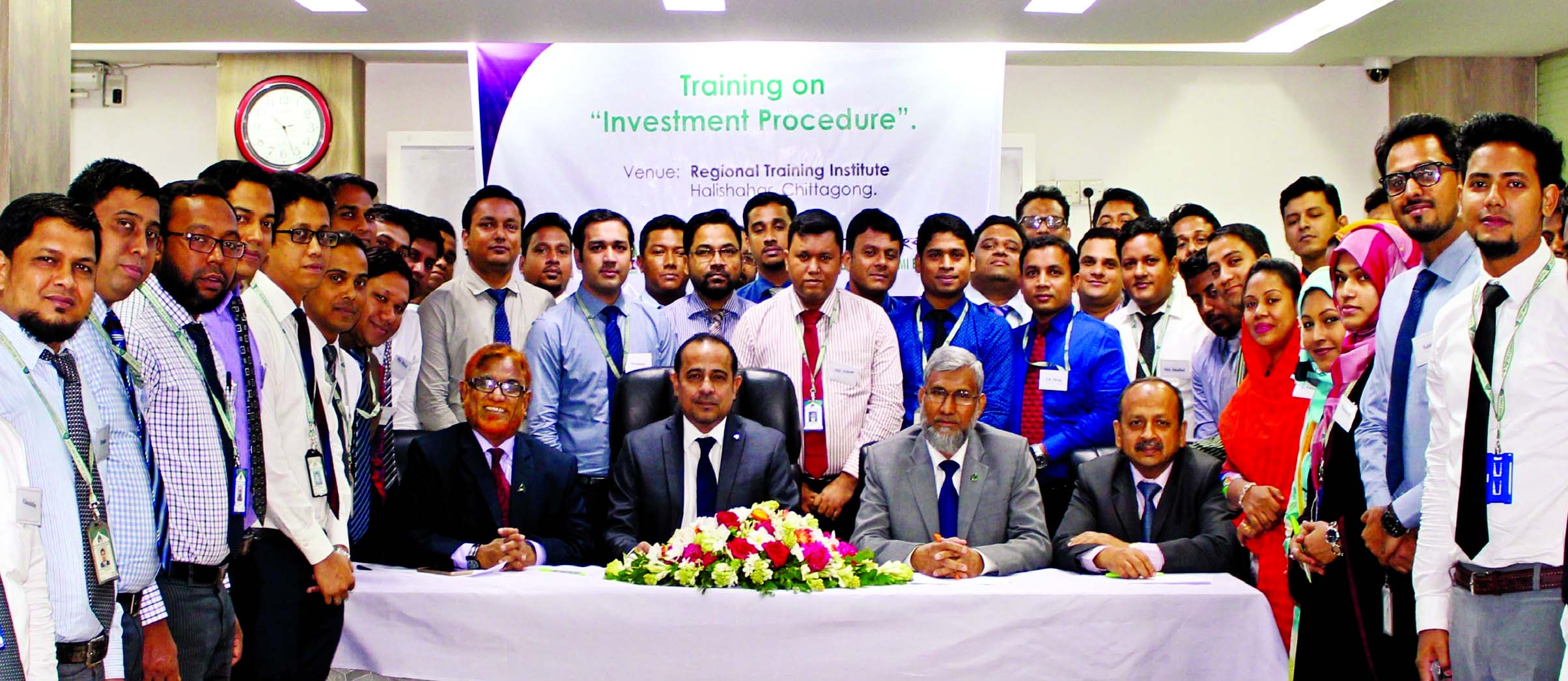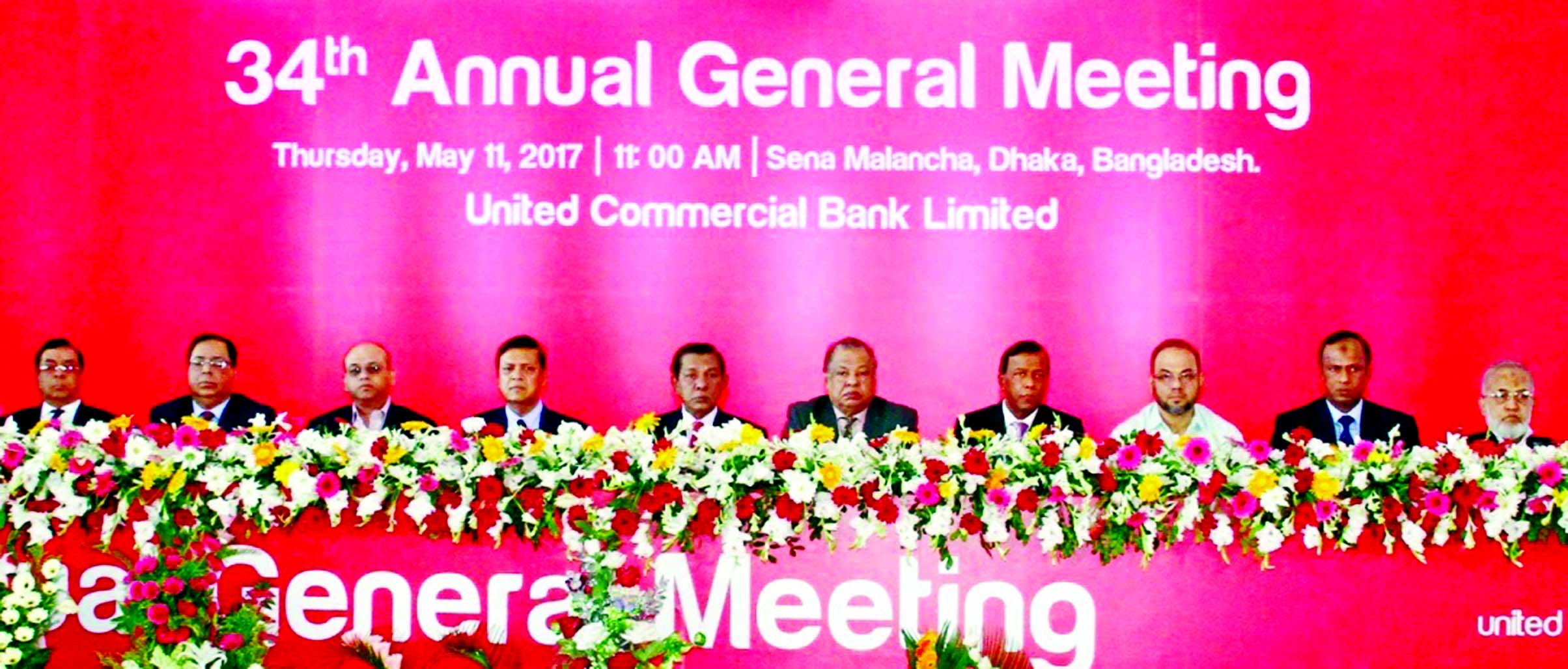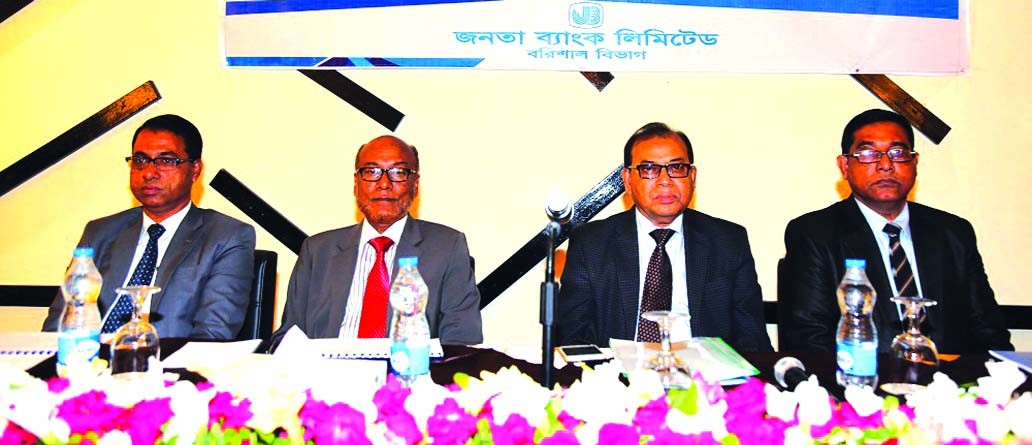Banking
Syed Habib Hasnat, Additional Managing Director of First Security Islami Bank Ltd, inaugurating a five day-long Training on "Investment Procedure" started at Bank's Regional Training Institute, Chittagong on Saturday. Md. Wahidur Rahman, Zonal Head, Chitt
 Syed Habib Hasnat, Additional Managing Director of First Security Islami Bank Ltd, inaugurating a five day-long Training on \"Investment Procedure\" started at Bank\'s Regional Training Institute, Chittagong on Saturday. Md. Wahidur Rahman, Zonal Head, Ch
Syed Habib Hasnat, Additional Managing Director of First Security Islami Bank Ltd, inaugurating a five day-long Training on \"Investment Procedure\" started at Bank\'s Regional Training Institute, Chittagong on Saturday. Md. Wahidur Rahman, Zonal Head, Ch
United Commercial Bank Limited holds its 34th Annual General Meeting at a city auditorium recently. Directors of the bank, Managing Director and senior officials and shareholders were present. The AGM approves 15pc cash dividend for the financial year 201
 United Commercial Bank Limited holds its 34th Annual General Meeting at a city auditorium recently. Directors of the bank, Managing Director and senior officials and shareholders were present. The AGM approves 15pc cash dividend for the financial year 2016.
United Commercial Bank Limited holds its 34th Annual General Meeting at a city auditorium recently. Directors of the bank, Managing Director and senior officials and shareholders were present. The AGM approves 15pc cash dividend for the financial year 2016.
Md. Abdus Salam, CEO of Janata Bank Limited, delivering speech at the Branch Managers Conference of Barisal Division on Saturday. Md. Nazim Uddin and Md Helal Uddin, DMDs of the bank were present as special guest while Mohammad Saiful Alam, GM of Division
 Md. Abdus Salam, CEO of Janata Bank Limited, delivering speech at the Branch Managers Conference of Barisal Division on Saturday. Md. Nazim Uddin and Md Helal Uddin, DMDs of the bank were present as special guest while Mohammad Saiful Alam, GM of Division
Md. Abdus Salam, CEO of Janata Bank Limited, delivering speech at the Branch Managers Conference of Barisal Division on Saturday. Md. Nazim Uddin and Md Helal Uddin, DMDs of the bank were present as special guest while Mohammad Saiful Alam, GM of Division
Govt to formalise mobile banking for remittance
Planning Minister A H M Mustafa Kamal said on Sunday the government is going to formally allow sending remittance from overseas countries to Bangladesh through mobile banking system.
"A significant volume of remittance is coming through the informal channels. Besides, the Bangladeshi expatriates are also sending money through bKash. So, the government has decided to formalise mobile banking system for sending foreign exchange," he said after the National Economic Council (NEC) meeting.
Referring to the discussion at the NEC meeting, the minister said the government wants to track all the remittances, including the formal channels and the informal channels, to check 'hundi' and other illegal operations for sending money from abroad.
He said according to the government plan, the central bank will have an account, where all the remittance operations will send foreign exchange.
Currently, the Bangladeshis working abroad send remittance through banking system, mobile banking and some other informal channels.
According to the minister, 14.31 per cent of the total remittance came through bKash in 2016, which is a significant amount of foreign exchange earnings.
"The remittance sent through bKash is not included in our foreign exchange reserve. So, the mobile banking operators like bKash will be allowed as the formal remittance-sending channel."
Researchers said nearly the same amount of remittance that comes to Bangladesh every year through the formal channels also comes through 'hundi' and other informal channels.
Mr Kamal said if the government cuts the fees and service charges for remittance, sending foreign exchange through the formal channels will rise.
According to the minister, 51 per cent of the total remittance in 2016 came through the banking channel, 12.66 per cent through money exchange houses, 12.31 per cent through 'hundi', 14.31 per cent through bKash, and 3.8 per cent through other channels.
Xi pledges to splash out on OBOR
BD stands to gain as $124b on offer

In a bid to add further impetus to China's flagship OBOR (one belt one road) initiative, Chinese President Xi Jinping on Sunday came up with a big volume of financial offers for participants which experts believe will benefit Bangladesh also.
Under the financial plan, he said his country will scale up financing by making an additional contribution of US$ 14.5 billion to the Silk Road Fund to support infrastructure development work along the OBOR map.
He made the disclosure while delivering a keynote speech at the opening ceremony of the first ever OBOR forum International Cooperation in Beijing in presence of heads of 29 states, including Russian President Vladimir Putin, Turkish President Recep Tayyip Erdo?an and Pakistan President Nawaz Sharif.
Terming the initiative as win-win benefits for the participating countries, he said China would provide assistance worth US$8.7 billion while emergency food aid amounting to US$ 290 million to the developing countries and international organisations in the next three years.
To provide more funding for the Belt and Road cooperation, China will also encourage financial institutions to conduct overseas RMB fund business with an estimated amount of about Yuan 300 billion, Mr. Xi said.
He said China Development Bank and Export-Import Bank of China will set up special lending schemes respectively worth US$ 36.2 billion and US$ 18.8 billion to support the belt and road cooperation on infrastructure development, industrial capacity building and financing.
Mentioning the financing bottleneck a key challenge to realising connectivity, he said China has engaged in multiple forms of financial cooperation with countries and organisations involved in the Belt and Road Initiative.
"The AIIB has provided 1.7 billion U.S. dollars in loans for nine projects in Belt and Road participating countries. The Silk Road Fund has made four billion U.S. dollars of investment".
Proposed by Xi in 2013, the Belt and Road Initiative is a grand plan to connect Asia with Europe and Africa along, and beyond, the ancient trade routes by putting in place an unparalleled trade and infrastructure network. So far, the initiative has won support from more than 100 countries and international organisations, of which over 40 have signed cooperation agreements with China.
Professor of International Affairs of Renmin University of China Wang Yiwei said the Chinese president clearly mentioned further enhancement of the fund along the OBOR countries and countries like Bangladesh will be among first beneficiaries of such special finance.
He explained that the industrialisation first happened in the United Kingdom (UK) before the wave reached other European countries and then it spread to the USA (United States of America) before coming to Asia.
He went on: China tasted the flavour of industrialisation after joining the WTO (World Trade Organisation) and it crossed the USA in 2010 as far as industrial base and perks are concerned. China is now spreading their heavy industrial base to other countries.
"Bangladesh is one of the first choices for Chinese investors. That's why many Chinese entreprenuers are engaged in many mega infrastructural projects in Bangladesh like Padma Bridge," he said.
About India's reluctance to join the initiative, he said China does not want to force any country into it. "India is a key member of the AIIB (Asian Infrastructure Investment Bank). China's good relation with Pakistan is maybe its concern. But I think India will come considering it an initiative of shared socioeconomic and cultural interests."
Reuters adds: Chinese President Xi Jinping pledged $124 billion for his new Silk Road plan to forge a path of peace, inclusiveness and free trade, and called for the abandonment of old models based on rivalry and diplomatic power games.
"We should build an open platform of cooperation and uphold and grow an open world economy," Xi told the opening of the two-day gathering in Beijing.
Xi said the world must create conditions that promote open development and encourage the building of systems of "fair, reasonable and transparent global trade and investment rules".
Xi pledged a major funding boost to the new Silk Road, including an extra 100 billion yuan ($14.50 billion) into the existing Silk Road Fund, 380 billion yuan in loans from two policy banks and 60 billion yuan in aid to developing countries and international bodies in countries along the new trade routes.
In addition, Xi said China would encourage financial institutions to expand their overseas yuan fund businesses to the tune of 300 billion yuan.



